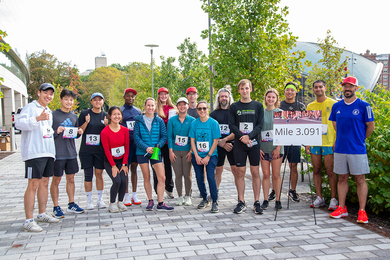At the October faculty meeting, Provost L. Rafael Reif reported on the state of the Institute's finances, noting that MIT's endowment increased to $6.7 billion last year, surpassing the peak achieved in fiscal 2000.
Speaking at the Oct. 19 meeting, which was held in Room 141 in the Stata Center, the provost said that in fiscal year 2004, the value of the endowment had been $5.87 billion. The endowment value increased by 14.4 percent during fiscal 2005, up to $6.71 billion. The $842 million growth in the value of the endowment was the result of a 17.6 percent market return, combined with additional contributions from gifts and after netting out distributions to support the Institute's operations. According to a 2004 report by the National Association of College and University Business Officers, MIT's endowment is sixth among American universities, trailing Harvard, whose endowment recently surpassed the $25 billion mark, Yale, the University of Texas system, Princeton and Stanford.
"Despite our relative financial strength, the Institute uses the endowment to balance its expenses," Reif said, showing graphs of how MIT's operating budget continued to rise in recent years as its endowment took a dip. The goal, he said, is to reduce the draw on the endowment to a level that is sustainable over the long term.
The administration and faculty will have to work together to identify future academic investments and priorities, and work around such present challenges as the bleak outlook for sponsored research and the increased cost of faculty startup packages, he said.
In addition to the good news that the Institute's financial position continued to strengthen in the 2005 fiscal year, President Susan Hockfield announced that an anonymous alumnus recently pledged $25 million to endow financial aid.
"One of my very serious goals is to increase our endowments for financial aid," Hockfield said. MIT currently spends more than $50 million each year providing need-blind financial aid to its students. Of that amount, last year $34 million was provided by funds distributed from scholarship endowments. The remaining $16 million came from the Institute's General Budget. This is money that could be used for other purposes if there were sufficient endowed funds to meet MIT's financial aid commitments.
In other business, Hockfield announced that a review panel has been formed to explore why a particular case of alleged research misconduct at the Lincoln Laboratory has been so difficult to resolve. She commented that MIT's policies and procedures have, time and again, effectively dealt with such allegations. The particular case in this instance has been more difficult to resolve, and "it is important to look at the process to determine where it has not worked well in this case," she said. The panel will "make recommendations about factors that might have complicated the resolution of the case, and how we might extract 'lessons learned' about our processes, to help avoid similar problems going forward," Hockfield said. The panel's work will be limited to a review of procedures and will not examine the specific allegations in the case. Hockfield further said that, in addition to the review panel, resolving the manner in which an investigation of the allegations in the case will be conducted is being pursued at a very high level with the U.S. Department of Defense (DOD).
Associate Provost Claude Canizares will chair the panel. The charge to the panel is to (i) identify the factors that have complicated and delayed the satisfactory resolution of this particular allegation of research misconduct, (ii) determine their implications, if any, for how the Institute should conduct itself in the future, and (iii) recommend any changes in policy and/or practice that would help avoid a recurrence. The panel has been requested to present its findings by the middle of January. In addition to Canizares, panel members are Institute Professor Mildred Dresselhaus; physics Professor David Litster, former vice president for research; and Dr. Gerald Dinneen. Dinnen was director of Lincoln Laboratory from 1970-77 and was a professor of electrical engineering at MIT from 1971-1981. He has held senior positions in industry, the DOD and the National Academy of Engineering.
The faculty also heard a report on planned changes to the Institute's disciplinary system. Chair of the Faculty Lorna Gibson, Matoula S. Salapatas Professor of Materials Science and Engineering, chaired a committee that reviewed MIT's disciplinary procedures for fairness and consistency.
Currently, cases of alleged misconduct filed with the Office of Student Conflict Resolution and Discipline (OSCRD) are sometimes pursued through Dean's panels and sometimes through the Committee on Discipline (COD).
Gibson said the committee recommends a "single pathway" that funnels all cases through the COD. The chair would decide if an alleged infraction should be handled by a full COD hearing, a smaller COD panel or, in cases where the student admits culpability, an administrative review.
In addition, complainants and respondents appearing before the COD would, upon request, be provided with outside faculty or senior staff advisors who would help them investigate and present their case.
Another significant change recommended is that appeals of COD decisions involving suspension, expulsion or revoking a degree should be made to the chancellor, rather than to the president. The chancellor would decide whether to hear an appeal, and his decision would be final. The committee found that at Brown, Harvard, Princeton, Stanford and Yale, the president does not handle appeals. "The chancellor is the person who oversees the lives and education of students and is better informed about issues that may come to bear on them," Hockfield said.
The proposed change in the appeal process will be put to a vote at the November faculty meeting.
Following the formal business of the meeting, there was opportunity for faculty to informally raise issues or ask questions of the president, provost and chancellor.
A version of this article appeared in MIT Tech Talk on October 26, 2005 (download PDF).





